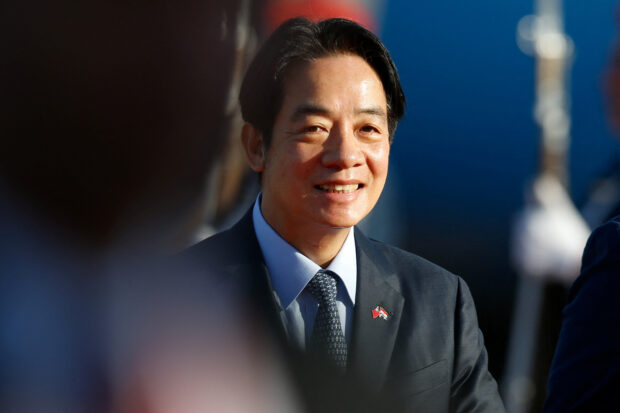EXPLAINER: Why is China so angry about Taiwan VP’s US trip?

Taiwan’s Vice President William Lai arrives to attend the inauguration of Paraguay’s President-elect Santiago Pena, in Luque, Paraguay, on August 14, 2023. REUTERS/Cesar Olmedo
TAIPEI — China launched military drills around Taiwan on Saturday, the day after Taiwan Vice President William Lai returned to Taipei after making two stopovers in the United States as part of a trip to Paraguay, angering China which views him as a separatist and a “troublemaker.”
Here are the key issues in Taiwan-US, China-US, and Taiwan-China relations, and why China is so upset about Lai’s visit to the United States.
WHY IS CHINA SO ANGRY?
Taiwan is a deeply emotive issue for China’s ruling Communist Party and for Chinese President Xi Jinping.
The People’s Republic of China has claimed Taiwan as its territory since the defeated Republic of China government fled to the island in 1949 after losing a civil war with Mao Zedong’s communists.
READ: China condemns visit of ‘troublemaker’ Taiwan VP to US
Article continues after this advertisementChina has repeatedly called on US officials not to engage with Taiwanese leaders or allow them into the country under any guise, viewing it as support for Taiwan’s desire to be viewed as separate from China.
Article continues after this advertisementChina has never renounced the use of force to bring democratically governed Taiwan under its control, and in 2005 passed a law giving Beijing the legal basis for military action against Taiwan if it secedes or seems about to.
WHY DOES CHINA DISLIKE WILLIAM LAI SO MUCH?
China believes Lai to be a separatist for his previous comments about being a “worker” for Taiwan independence, though Lai says that as the Republic of China they are already an independent country.
READ: Taiwan sees no Chinese military response to VP’s US trip
While Taiwan and the United States said Lai’s US transits were routine and no cause for China to react badly, Beijing said Lai’s trips were for him to “rely on the United States to seek independence” and a “disguise” to “seek gains in the local election through dishonest moves.”
Lai is the ruling Democratic Party’s presidential candidate for the January elections and is leading the polls.
READ: China military action to US stopover would be election interference, Taiwan VP says
WHAT IS THE RELATIONSHIP BETWEEN TAIWAN AND THE UNITED STATES?
In 1979, the United States severed official relations with the government in Taipei and instead recognized the government in Beijing. A Taiwan-US defense treaty was terminated at the same time.
Post-1979, the US relationship with Taiwan has been governed by the Taiwan Relations Act, which gives a legal basis to provide Taiwan with the means to defend itself, but does not mandate that the United States come to Taiwan’s aid if attacked.
While the United States has long followed a policy of “strategic ambiguity” on whether it would intervene militarily to protect Taiwan in the event of a Chinese attack, US President Joe Biden has said he would be willing to use force to defend Taiwan.
The United States continues to be Taiwan’s most important international source of weapons, and Taiwan’s contested status is a constant source of friction between Beijing and Washington.
WHAT IS TAIWAN’S POSITION AND DIPLOMATIC STATUS?
Taiwan’s government says that as the People’s Republic of China has never ruled the island it has no right to claim sovereignty over it or speak for or represent it on the world stage, and that only Taiwan’s people can decide their future.
Taiwan’s official name continues to be the Republic of China, though these days the government often stylizes it as the Republic of China (Taiwan). Only 13 countries now formally recognize Taiwan, including Paraguay.
Taiwan’s government says that as the Republic of China it is a sovereign country and it has a right to state-to-state ties.
WHAT ARE RELATIONS LIKE BETWEEN TAIPEI AND BEIJING?
Very Bad.
China views Taiwan President Tsai Ing-wen as a separatist and has rebuffed repeated calls from her for talks. Tsai says she wants peace but that her government will defend Taiwan if it is attacked.
READ: Taiwan president vows to keep ‘status quo’ on cross-strait relations
She says the Republic of China and People’s Republic of China are “not subordinate” to each other. Beijing says Tsai must accept that both China and Taiwan are part of “one China.”
Neither side recognizes the other and China cut off a formal dialogue mechanism after Tsai first won office in 2016.